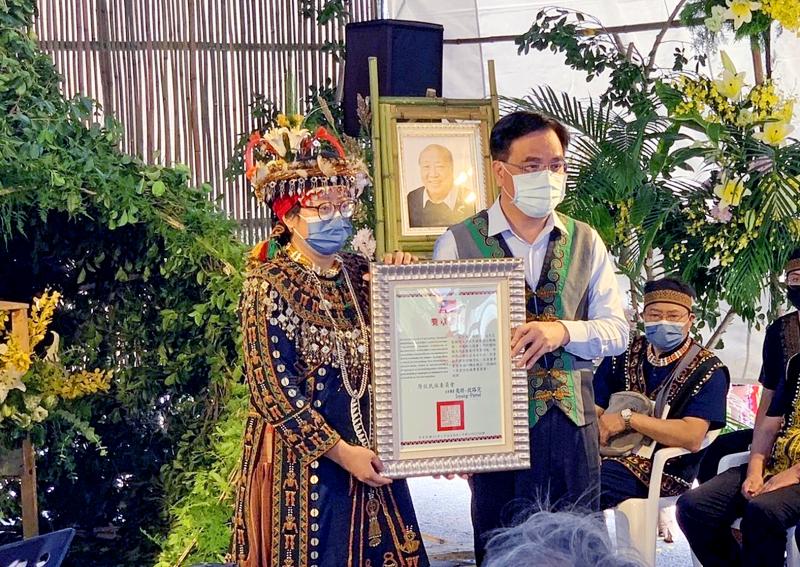The life of former National Assembly representative and Paiwan doctor Gui Giling was on Friday commemorated at a funeral in Taitung County’s Jinfong Township (金鋒), where he was remembered for his efforts in changing how indigenous people are treated in Taiwan.
Council of Indigenous Peoples Minister Icyang Parod said that Gui, a long-time supporter of the indigenous movement, had “charged on stage” during the 1994 convention of the National Assembly and demanded a revote on a motion to remove the term “mountain compatriots” (山胞) from the Constitution to refer to indigenous people.
Gui was a National Assembly representative from 1991 to 1994.

Photo: Huang Ming-tang, Taipei Times
Although the motion initially failed to pass the threshold to amend the Constitution, the revote ensured that from Aug. 1, 1994, the Constitution would use the term “indigenous people” (原住民), Icyang said.
Following his retirement from politics at age 65, Gui opened a clinic in his home township of Jinfong. He was the first indigenous doctor to practice medicine in the county.
Over the next several years, he was pivotal in helping the township resolve medicine shortages, and he often headed indigenous medical teams to interact and collaborate with the international medical community.
People are sad that he has passed away, and have the utmost respect for his efforts to protect the rights of indigenous peoples, Icyang said.
Icyang yesterday presented Gui’s family with the highest-level indigenous award to posthumously recognize Gui’s many contributions to indigenous society.
Gui contracted COVID-19 while hospitalized for other illnesses. He passed away on May 17 at the age of 73.

Chinese Nationalist Party (KMT) Chairman Eric Chu (朱立倫), spokeswoman Yang Chih-yu (楊智伃) and Legislator Hsieh Lung-chieh (謝龍介) would be summoned by police for questioning for leading an illegal assembly on Thursday evening last week, Minister of the Interior Liu Shyh-fang (劉世芳) said today. The three KMT officials led an assembly outside the Taipei City Prosecutors’ Office, a restricted area where public assembly is not allowed, protesting the questioning of several KMT staff and searches of KMT headquarters and offices in a recall petition forgery case. Chu, Yang and Hsieh are all suspected of contravening the Assembly and Parade Act (集會遊行法) by holding

PRAISE: Japanese visitor Takashi Kubota said the Taiwanese temple architecture images showcased in the AI Art Gallery were the most impressive displays he saw Taiwan does not have an official pavilion at the World Expo in Osaka, Japan, because of its diplomatic predicament, but the government-backed Tech World pavilion is drawing interest with its unique recreations of works by Taiwanese artists. The pavilion features an artificial intelligence (AI)-based art gallery showcasing works of famous Taiwanese artists from the Japanese colonial period using innovative technologies. Among its main simulated displays are Eastern gouache paintings by Chen Chin (陳進), Lin Yu-shan (林玉山) and Kuo Hsueh-hu (郭雪湖), who were the three young Taiwanese painters selected for the East Asian Painting exhibition in 1927. Gouache is a water-based

Taiwan would welcome the return of Honduras as a diplomatic ally if its next president decides to make such a move, Minister of Foreign Affairs Lin Chia-lung (林佳龍) said yesterday. “Of course, we would welcome Honduras if they want to restore diplomatic ties with Taiwan after their elections,” Lin said at a meeting of the legislature’s Foreign Affairs and National Defense Committee, when asked to comment on statements made by two of the three Honduran presidential candidates during the presidential campaign in the Central American country. Taiwan is paying close attention to the region as a whole in the wake of a

OFF-TARGET: More than 30,000 participants were expected to take part in the Games next month, but only 6,550 foreign and 19,400 Taiwanese athletes have registered Taipei city councilors yesterday blasted the organizers of next month’s World Masters Games over sudden timetable and venue changes, which they said have caused thousands of participants to back out of the international sporting event, among other organizational issues. They also cited visa delays and political interference by China as reasons many foreign athletes are requesting refunds for the event, to be held from May 17 to 30. Jointly organized by the Taipei and New Taipei City governments, the games have been rocked by numerous controversies since preparations began in 2020. Taipei City Councilor Lin Yen-feng (林延鳳) said yesterday that new measures by